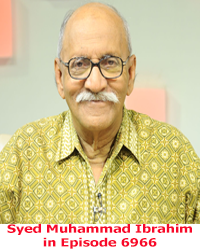Syed Muhammad Ibrahim

| Retired Army Officer & Politician |
| Politics |
Full Name: Major General Syed Muhammad Ibrahim (Retd.), BP
Affiliation: Bangladesh Kallyan Party
Current Position: Chairman
Date of Birth: October 04, 1949
Place of Birth: Bangladesh
Home District: Chittagong
Constituency: 282, Chittagong-5
Term: Nil
Nationality: Bangladeshi
Profile:
Major General Syed Muhammad Ibrahim (Retd.), BP (04 October 1949) is a Bangladeshi politician and retired Major General of the Bangladesh Army. He is the founder and Chairman of Bangladesh Kallyan Party. He was awarded Bir Protik, the fourth highest gallantry award for military personnel in Bangladesh for his bravery during the Bangladesh Liberation war.
Ibrahim was born a traditional Muslim family in Chittagong. Having grown up, he made to the–then and now also famous ‘Faujdarhat Cadet College’ a premier residential school of the country. He left Faujdarhat in 1968 at the end of excellent higher-secondary schooling. He did his Bachelor-of-Arts from Dhaka University in 1974 and Master-in-Defense Studies from National University of Bangladesh in 2003 with meritorious result. Currently he is a researcher for PhD Program in Department of Peace and Conflict studies University of Dhaka.
Ibrahim joined the Pakistan Military Academy in January 1970 and was commissioned in the East Bengal Regiment of Pakistan Army’s Infantry Corps. He was assessed the top cadet of his class while being commissioned, in September 1970. As an officer of the famous 2nd East Bengal Regiment, he joined the Liberation War of Bangladesh and fought gallantly for the entire period from 26 March 1971 to 16 December 1971. He was decorated with the gallantry award ‘Bir Protik (BP)’.
While in the Bangladesh Army, Ibrahim commanded all echelons of infantry from Company to Division and held prestigious staff as well as instructional appointments. He was an outstandingly successful Brigade Commander in Rangamati-Khagrachari of Chittagong Hill Tracts (1987-1989) and pioneer as well as participant in peace-negotiation with the ethnic-insurgents operating in that area. As part of his military education, Ibrahim attended ‘The Royal Staff College’ at Camberly, UK (1982-83) and the ‘US Army War College’ at Carlisle Barracks in Pennsylvania (1989-1990). Immediately before retirement from the Bangladesh Army in June 1996, General Ibrahim was the Director General of the government think-tank ‘Bangladesh Institute of International and Strategic Studies (BIISS)’ located in Dhaka.
However, intellectual and academic activities being his passion, Ibrahim was the founder Executive Director of a private sector think-tank called ‘Center for Strategic and Peace Studies’ for four years ending in February 2003. For the next three years, he was the First President of another organization called ‘Islamic Institute for Research and Propagation of the Teachings of Hazrat Mohammad (SAW)’. Currently he is the Chairman of a non-political voluntary organization called ‘Moulana Bhasani Foundation’ working towards raising political awareness in favor of honesty, democratic attitudes, and national reconciliation.
In December 2007 during the 2006–08 Bangladeshi political crisis, he founded a new political party named "Bangladesh Kallyan Party". His party joined the National United Front in 2008 led by Kamal Hossain. He was re-elected Chairman of the party on 5 December 2015. His party is a Member of the 20-Party Alliance led by Bangladesh Nationalist Party. On 16 December 2015, he was prevented by Special Security Forces from entering Bangabhaban, presidential palace, for Victory Day celebrations because his name was on an exclusionary list. This was the first time since 1980 he was not allowed to enter the celebrations at the presidential palace.
Ibrahim is a prolific and influential writer and speaker. He writes irregular but frequent columns for the major newspapers of Dhaka. He is equally keen on matters related to inter-faith or multi religious harmony, national security, nation building, peace processes and Islam as a religion of peace. Over the years he has become an important opinion-builder himself which had led to expectations in the mind of millions about him becoming a leader of the people. He is also an author of repute. There are two volumes of collections of his columns, and four books of other sorts to his credit. One of the important ones is ‘An Evaluation of the Environment and Situation Prevailing in Chittagong Hill Tracts and the Peace Process’.
Register for comment









